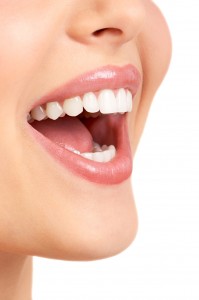 Have you ever noticed that your teeth feel a little…well, fuzzy at the end of the day? What you’re feeling isn’t fuzz, of course, but plaque. You may have heard your dentist talk about plaque before, but do you know what it is?
Have you ever noticed that your teeth feel a little…well, fuzzy at the end of the day? What you’re feeling isn’t fuzz, of course, but plaque. You may have heard your dentist talk about plaque before, but do you know what it is?
Plaque is a sticky biofilm made up of hundreds and hundreds of naturally-occurring bacteria. These bacteria feed on the food we put in our mouths, and they especially love foods high in sugar or other carbohydrates. As these bacteria feed on these particles, they create an acidic byproduct that damages tooth enamel, resulting in cavities.
So, given how destructive plaque, bacteria, and this acidic byproduct can be, you may be wondering what you can do to keep it in check. Below are eight tips for managing and getting rid of plaque.
Tip #1
Brush at least twice a day, but if possible, after every meal.
Tip #2
Floss at least once a day. Flossing will help you remove pieces of food or particle of plaque from beyond teeth, where they can contribute to decay.
Tip #3
Consider adding an antibacterial mouthwash to your at-home oral health regimen. Reducing the amount of bacteria from your mouth will reduce your vulnerability to decay. A fluoride mouthwash can also help you strength your tooth enamel.
Tip #4
Chew sugarless gum after and in between meals. Gum helps remove particles of food from between teeth and stimulates the production of saliva, which neutralizes acid.
Tip #5
Reduce the amount of sweet or starchy foods you consume. Even a natural snack like raisins can be problematic.
Tip #6
Avoid smoking or any kind of tobacco use. Besides being bad for your health, smokers routinely have higher amounts of hardened plaque.
Tip #7
Make regular checkups and cleanings with your local dentist a priority. A cleaning by a professional hygienist will help you get rid of plaque in places that are hard to reach with normal brushing and flossing.
Tip #8
Dental sealants protect the chewing surfaces of teeth from bacteria and plaque with a thin layer of plastic. This effective option works especially well for back teeth and may help children who are more vulnerable to decay.
Do you have questions about plaque or how to prevent it? Has it been more than six months since your last checkup or cleaning? Call your local dentist today for an appointment.
 You may be ready to send your kids back to school, but don’t forget to schedule their dental appointments! It’s easier to bring your children to the dentist when they don’t have to miss class, and it will be less of a hassle for you. Although kids undoubtedly would like to get out of school for their dental visit, protect their wellbeing and education with an earlier trip to the dentist!
You may be ready to send your kids back to school, but don’t forget to schedule their dental appointments! It’s easier to bring your children to the dentist when they don’t have to miss class, and it will be less of a hassle for you. Although kids undoubtedly would like to get out of school for their dental visit, protect their wellbeing and education with an earlier trip to the dentist!
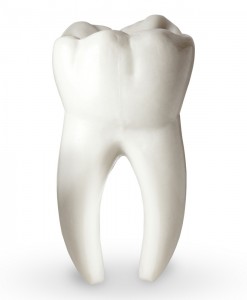 Here’s a brief list of everyday teeth cheats, or simple habits you should adopt to increase the lifetime of your teeth. These little rituals are easy to fit into anyone’s daily routine, and can really save you extensive time (and money) that may otherwise be spent on tooth repairs and restorations.
Here’s a brief list of everyday teeth cheats, or simple habits you should adopt to increase the lifetime of your teeth. These little rituals are easy to fit into anyone’s daily routine, and can really save you extensive time (and money) that may otherwise be spent on tooth repairs and restorations. Choose cheese for your next sandwich ingredient or salad-topper! As a child, everyone has heard parents and other adults lecturing on the importance of eating vegetables and drinking milk to grow up big and strong. But did you know that eating certain types of cheese at any age can also help you stay healthy?
Choose cheese for your next sandwich ingredient or salad-topper! As a child, everyone has heard parents and other adults lecturing on the importance of eating vegetables and drinking milk to grow up big and strong. But did you know that eating certain types of cheese at any age can also help you stay healthy? Vitamins and minerals have been shown to have a countless number of various benefits for the human body, and some may have benefits specifically for your smile. New research has shown that vitamin D may help lower your risk of tooth decay. And because the modern lifestyle often keeps us out of the sun (the main source of vitamin D) and few of us drink vitamin D-enriched whole milk these days, vitamin D supplements may be a vital part of your oral health regimen.
Vitamins and minerals have been shown to have a countless number of various benefits for the human body, and some may have benefits specifically for your smile. New research has shown that vitamin D may help lower your risk of tooth decay. And because the modern lifestyle often keeps us out of the sun (the main source of vitamin D) and few of us drink vitamin D-enriched whole milk these days, vitamin D supplements may be a vital part of your oral health regimen. Some people love the taste of coconut, and coconut water has been a trendy drink in the last couple of years. But whether you love it on your German chocolate cake or can’t stand the stuff, recent research shows that coconut may have more than just taste benefits. Well, coconut oil, that is. According to a study from the Athlone Institute of Technology in Ireland, coconut oil’s antibacterial properties could spell good news for your smile and help you avoid cavities.
Some people love the taste of coconut, and coconut water has been a trendy drink in the last couple of years. But whether you love it on your German chocolate cake or can’t stand the stuff, recent research shows that coconut may have more than just taste benefits. Well, coconut oil, that is. According to a study from the Athlone Institute of Technology in Ireland, coconut oil’s antibacterial properties could spell good news for your smile and help you avoid cavities.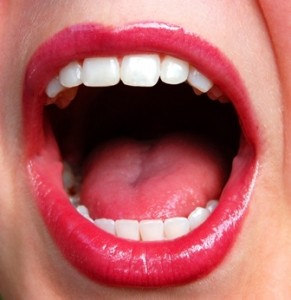 Have you noticed friends or co-workers stand further away than necessary to talk to you? Do you receive daily offers of gum and mints? Does your dog run away when you bend down and say hello? If the answer is yes to any of these questions … you probably have bad breath, also called halitosis.
Have you noticed friends or co-workers stand further away than necessary to talk to you? Do you receive daily offers of gum and mints? Does your dog run away when you bend down and say hello? If the answer is yes to any of these questions … you probably have bad breath, also called halitosis.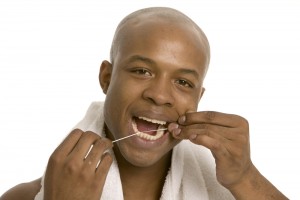 You know how it goes: you visit the dental office, and your dentist tells you to floss more often. Perhaps your dentist finds a spot of mild gum disease, giving you even more reason to start flossing regularly. The truth is, you really can’t maintain long-term oral health without flossing. Brushing and using mouthwash play a big role in a healthy smile, but nothing gets between teeth and below the gum line like flossing.
You know how it goes: you visit the dental office, and your dentist tells you to floss more often. Perhaps your dentist finds a spot of mild gum disease, giving you even more reason to start flossing regularly. The truth is, you really can’t maintain long-term oral health without flossing. Brushing and using mouthwash play a big role in a healthy smile, but nothing gets between teeth and below the gum line like flossing.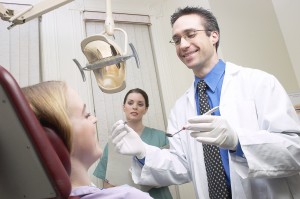 cancer, and testicular cancer put together. But the more you learn about oral cancer and its signs and symptoms, the better able you’ll be to get an early diagnosis and more effective treatment should oral cancer happen to you. Oral cancer responds very well to treatment in the earliest stages.
cancer, and testicular cancer put together. But the more you learn about oral cancer and its signs and symptoms, the better able you’ll be to get an early diagnosis and more effective treatment should oral cancer happen to you. Oral cancer responds very well to treatment in the earliest stages.